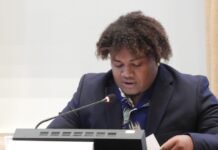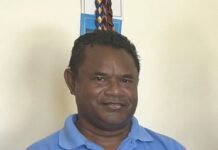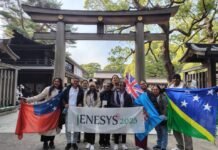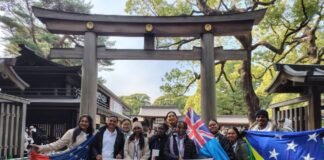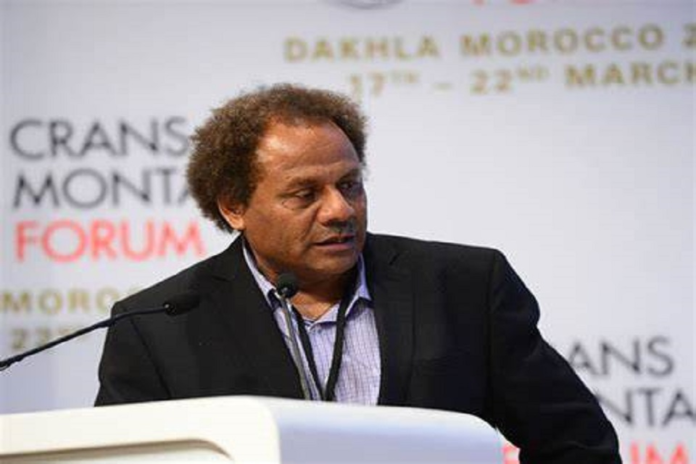
A tribute to John Moffat Fugui
By Derek Gwali Futaiasi
The Australian National University, Australia
In 1995, when the late Solomon Islands Ambassador to the Peoples Republic of China (PRC), his Excellency John Moffat Fugui, was a PhD candidate at the University of Hawai’i at Manoa, Hawaiʻi, United States, he wrote a moving piece titled “A Hero has Fallen”. It was a tribute to his senior brother, the late Fr. Leslie Fugui.
Today, as we reflect on the life and passing of John Moffat Fugui – whom I will refer to simply ast “Moffat” in this piece – the words he used to describe his older brother have been given a ‘breathe and life’. For those of us close to Moffat, we have lost a hero, a statesman, a politician, a teacher and a mentor.
As a research student, I have known Moffat as both an insider and outsider. As an insider, I am related to him through my mother’s tribe. As an outsider, because of his privileged position in government, he was one of the few willing to provide substantial information regarding state-society relations in Solomon Islands, which is one of the focus of my PhD project. In this context, Moffat’s state-society ideas greatly interested me, but I was even more fascinated by his philosophical positions.
These insider-outsider positionalities inform my reflections about him and the writing of this piece.
Solomon Islands has lost a well-read leader at a critical juncture in our history; a leader with a deep understanding of the dynamics of Solomons’ political economy, power relations, the relationship between state-society, international politics and geo-political relations. In truth, his departure has left gaps within the state structure or government machinery on these socio-political and critical issues that need proper guidance, advice and leadership.
Let me highlight what I see as the most dynamic feature of Moffat’s state-society leadership. Moffat neatly interweaved the relationship between kastom, state and church in terms of his leadership. Such an approach buttressed how he led at both the constituency and national levels. In Solomon Islands, our system of governance needs to harness such a relationship so that we create, invent and craft a state-society relationship that works for us and that considers our life’s realities. While such structures are not perfect, this is an important framework for leadership in Solomon Islands going forwards.
Moreover, his love for books and knowledge inspired the many Solomon Islanders he met, confronted and taught, hence his impact on their intellectual investigation and know-how. This partially means that our tok-stories did not revolve around assumptions and gossip; they revolved around deep-stories – rooted socio-economic-political ideas and narrations supported by evidence. Not surprisingly, this was clearly articulated by Moffat, who once said to me, “So, for every discipline, I have chosen my favourite scholar. So, when I buy books, I buy the author – not always the book. I look at their backgrounds and experiences. If the YouTube, I listen for their voice. If they are Godly people, your spirit man will be moved.” This perception, among others, provide solid ground to invigorate insightful tok-stories, thus, downplaying the typical “me-me” stories usually advanced by average leaders.
In our tok-stori via WeChat, a few days prior to his passing, Moffat emphasized the supremacy of Jesus Christ and said that, “God is always right on time”.
During our manyconversations, we talked about many international, national, and local issues, including constituency, ward, community and village issues. We spoke of many academics, national leaders and global gurus. Together we shared many exciting books by prolific writers and authors. In one of these conversations, Moffat said,“I have heard and seen many well-known people…I was impressed…But Jesus had changed me to see more, even for the things of Heaven! These have been enough, Koo! With Jesus, Koo, the rest is footnote! It was in New Zealand that Jesus found me!” Thank you, Koo, for reinforcing and showing us the greatness and supremacy of Jesus Christ.
Moffat’s last messagevia WeChat to me was entitled “God Is Always Right on Time”, a title borrowed from short messages by Dr Ed Young. The message finds its root in the words of Isaiah 65:24, which states, “It will also come to pass that before they call, I will answer; and while they are still speaking, I will hear.”My last and closing prayer focus with Moffat revolved around the need to praise God for sending Jesus when we need Him.
Let us therefore thank God for the life and times of John Moffat Fugui – our tribal leader, teacher, mentor, statesman, and diplomat. Although we love him, God loves him more, hence, the perfect time for his union with Christ.
It was Trevor Ramoniwho first informed me about John Moffat Fugui’s passing. “I felt total grief”, to use the words of the NobelPeace prize winner Amartya Sen on the passing on of his long-time friend Dennis Robertson.
Today, although we mourn the passing of my uncle, a thoughtful leader and profound mentor, we should be comforted by his life’s rainbows: a history of high excellence. Personally, death will never take away good men like Moffat forever. The inspiration he crafted within the hearts of those who looked up to him as a leader will remain his legacy and continue well into the future.











